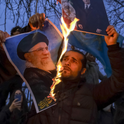Eide (second from left) arrives at a UN compound in Kabul with Secretary-General Ban Ki-moon (third from right), November 2009. Photo: UN/Eric Kanalstein
Power Struggle Over Afghanistan: An Inside Look at What Went Wrong—and What We Can Do to Repair the Damage by Kai Eide (Skyhorse Publishing, £18.99)
Kai Eide, one of those honourable public servants Scandinavia gives the world in such disproportionate numbers, has published his account of running the UN in Afghanistan. If you read one book about Afghanistan make it Barfield, Rashid or Coll. But when the time comes to write the history of that country since 2001—what a philippic against western leaders that will be—Eide’s will be a useful testimony. For now, it raises the central question about what to do next in Afghanistan.
Eide deserves credit for exploring contacts with the Taliban and counting Afghan civilian casualties when neither was fashionable. He was given the responsibility but not the authority to coordinate aid: "Where did all the money go?” is the apt title of one of his chapters. Few foreigners have worked more closely with President Karzai. For some, he was too close, and dissent over his handling of the last presidential election spilled acrimoniously onto the world’s editorial pages. According to his deputy Eide was underplaying Karzai’s fraud; to Eide, his deputy was in league with Richard Holbrooke to replace Karzai.
What is the point of sending a representative of the United Nations to a desperate corner of the Earth? In other words, when a UN official steps out of a white plane or land cruiser, what, beyond his own wits, does he bring? Sometimes soldiers, though usually too few to be decisive. Exceptionally, interim executive powers. But his greatest and often his only asset is legitimacy.
Legitimacy is potent. It has enabled the UN, despite tragic failures, to achieve a more transformative legacy—more peaceful and more democratic, according to RAND’s authoritative study—in place of conflict than anyone else. The UN’s legitimacy is born of its universal membership and universal values, but it lives or dies with impartiality. Working impartially in a warzone can take preternatural wisdom and courage (neutrality, as the Red Cross knows, is hard enough). But impartiality is what the great UN peacemakers—Nobel laureates like Dag Hammarskjöld and Ralph Bunche—guarded above all. Whenever UN officials abandon it, they cast their profession back to 1919, when the principle first began to shape the international service.
All this would be irrelevant to Afghanistan if Nato was about to leave behind a sustainable regime. But few of Nato’s propagandists still believe this. The Afghan state is so degenerate it recently starved to death some of its own police and soldiers at the Dawood National Military Hospital. The UN would be equally irrelevant if Washington had a workable plan B. As far as its plans can be divined in an election year, they rely on keeping thousands of special operations forces and the increasingly militarised CIA in the country, as conventional forces go home. These partners have a pedigree in Afghanistan before and after 2001 of pursuing tactical security goals at the expense of Afghan stability. Where would the Taliban and the Haqqanis be today without the CIA?
Sooner or later it is likely that world leaders will turn, in hope or desperation, to the UN. Could the UN be the west’s exit strategy? Could it be a peacemaker in Afghanistan? It would certainly be the cheapest option. Even if Muslim peacekeepers were needed to police an eventual settlement the cost would be a fraction of western forces and more broadly shared. The UN system also has an unmatched range and reach of activities in Afghanistan, from humanitarian aid to capacity development. It has the best-informed network of field offices, thanks partly to a large body of excellent Afghan staff. It has promising new leadership and, having been in Afghanistan for decades, staying power.
If only this were the whole story. Who could be surprised by Eide’s lament: “The UN bureaucracy, with its impenetrable rules and regulations and its internal turf fighting, made it impossible to react quickly and implement a demanding mandate.”
It is not enough, as the Century Foundation recommended in the most serious work yet on an Afghan peace process, simply to appoint a UN mediator. Whoever wants the UN to be a vehicle for peace must look under the bonnet. The two things Eide’s successors need most are the ability to hire staff within a few months and authority to make the many UN entities in the country a unified mission in fact as well as name.
Above all, the principle of impartiality must infuse the Security Council mandate and the UN’s words and actions on the ground if it is to play the peacemaker. Would it still be a fool’s errand? Two observations suggest not. Firstly, the commonality of interest in the region. Secondly, the steps that could be taken within Afghanistan to make it governable.
This is not Israel-Palestine. Giving Afghanistan the space to breathe and the chance of a political life of its own does not call for historic sacrifices by its neighbours. It is mutual distrust, however poisonous, and uncertainty that induce their interference. The UN is tailor-made to convene the negotiation of mutual guarantees to replace their destructive hedging, and ease the supply of confidence rather than arms and cash. American engagement will animate this process but its dysfunctional and non-existent relations with Afghanistan’s two main neighbours make it an unpromising regional mediator.
Within Afghanistan the UN role would be something like the patient seamstress of a patchwork quilt. For example, only the UN can facilitate the constitutional moment prompted by opening a political door for the Taliban, Karzai’s term limit, and changing relations with the outside world. It will have to be more sophisticated than 2004, when, said UN envoy Lakhdar Brahimi “we took the very decent constitution of 1964 and just took out the king.” Afghan constitutional history is tragedy repeated so often it reads like farce. Again and again since the Iron Emir, a highly centralised state has been forced against the grain of society. It has never taken. Afghanistan is not fissiparous, and the next government in Kabul will need to cede control to gain authority.
The greatest rebuke to those who write off Afghanistan as inherently ungovernable are its little-noticed young public servants. From Kabul ministries to provincial offices in every part of the country I was struck by their grace and ability. I wondered if I was becoming sentimental until Thomas Barfield concluded his magisterial history of Afghanistan:
“These younger people make up the bulk of the technocratic skills needed to make the country work, yet they find themselves taking orders from uneducated political appointees who treat their offices as vehicles for plunder.”
Theirs is more than technocratic skill. They promise leadership to remake their country. That is something outsiders can never do. But to give them a chance, we could remake the UN’s mission: Afghanistan’s last, best hope of help.
Hugh Roberts has worked for UNDP in New York, Cairo and Kabul. He was a visiting fellow at the London School of Economics and contributes leaders to The Guardian. HughFRoberts@hotmail.com
Power Struggle Over Afghanistan: An Inside Look at What Went Wrong—and What We Can Do to Repair the Damage by Kai Eide (Skyhorse Publishing, £18.99)
Kai Eide, one of those honourable public servants Scandinavia gives the world in such disproportionate numbers, has published his account of running the UN in Afghanistan. If you read one book about Afghanistan make it Barfield, Rashid or Coll. But when the time comes to write the history of that country since 2001—what a philippic against western leaders that will be—Eide’s will be a useful testimony. For now, it raises the central question about what to do next in Afghanistan.
Eide deserves credit for exploring contacts with the Taliban and counting Afghan civilian casualties when neither was fashionable. He was given the responsibility but not the authority to coordinate aid: "Where did all the money go?” is the apt title of one of his chapters. Few foreigners have worked more closely with President Karzai. For some, he was too close, and dissent over his handling of the last presidential election spilled acrimoniously onto the world’s editorial pages. According to his deputy Eide was underplaying Karzai’s fraud; to Eide, his deputy was in league with Richard Holbrooke to replace Karzai.
What is the point of sending a representative of the United Nations to a desperate corner of the Earth? In other words, when a UN official steps out of a white plane or land cruiser, what, beyond his own wits, does he bring? Sometimes soldiers, though usually too few to be decisive. Exceptionally, interim executive powers. But his greatest and often his only asset is legitimacy.
Legitimacy is potent. It has enabled the UN, despite tragic failures, to achieve a more transformative legacy—more peaceful and more democratic, according to RAND’s authoritative study—in place of conflict than anyone else. The UN’s legitimacy is born of its universal membership and universal values, but it lives or dies with impartiality. Working impartially in a warzone can take preternatural wisdom and courage (neutrality, as the Red Cross knows, is hard enough). But impartiality is what the great UN peacemakers—Nobel laureates like Dag Hammarskjöld and Ralph Bunche—guarded above all. Whenever UN officials abandon it, they cast their profession back to 1919, when the principle first began to shape the international service.
All this would be irrelevant to Afghanistan if Nato was about to leave behind a sustainable regime. But few of Nato’s propagandists still believe this. The Afghan state is so degenerate it recently starved to death some of its own police and soldiers at the Dawood National Military Hospital. The UN would be equally irrelevant if Washington had a workable plan B. As far as its plans can be divined in an election year, they rely on keeping thousands of special operations forces and the increasingly militarised CIA in the country, as conventional forces go home. These partners have a pedigree in Afghanistan before and after 2001 of pursuing tactical security goals at the expense of Afghan stability. Where would the Taliban and the Haqqanis be today without the CIA?
Sooner or later it is likely that world leaders will turn, in hope or desperation, to the UN. Could the UN be the west’s exit strategy? Could it be a peacemaker in Afghanistan? It would certainly be the cheapest option. Even if Muslim peacekeepers were needed to police an eventual settlement the cost would be a fraction of western forces and more broadly shared. The UN system also has an unmatched range and reach of activities in Afghanistan, from humanitarian aid to capacity development. It has the best-informed network of field offices, thanks partly to a large body of excellent Afghan staff. It has promising new leadership and, having been in Afghanistan for decades, staying power.
If only this were the whole story. Who could be surprised by Eide’s lament: “The UN bureaucracy, with its impenetrable rules and regulations and its internal turf fighting, made it impossible to react quickly and implement a demanding mandate.”
It is not enough, as the Century Foundation recommended in the most serious work yet on an Afghan peace process, simply to appoint a UN mediator. Whoever wants the UN to be a vehicle for peace must look under the bonnet. The two things Eide’s successors need most are the ability to hire staff within a few months and authority to make the many UN entities in the country a unified mission in fact as well as name.
Above all, the principle of impartiality must infuse the Security Council mandate and the UN’s words and actions on the ground if it is to play the peacemaker. Would it still be a fool’s errand? Two observations suggest not. Firstly, the commonality of interest in the region. Secondly, the steps that could be taken within Afghanistan to make it governable.
This is not Israel-Palestine. Giving Afghanistan the space to breathe and the chance of a political life of its own does not call for historic sacrifices by its neighbours. It is mutual distrust, however poisonous, and uncertainty that induce their interference. The UN is tailor-made to convene the negotiation of mutual guarantees to replace their destructive hedging, and ease the supply of confidence rather than arms and cash. American engagement will animate this process but its dysfunctional and non-existent relations with Afghanistan’s two main neighbours make it an unpromising regional mediator.
Within Afghanistan the UN role would be something like the patient seamstress of a patchwork quilt. For example, only the UN can facilitate the constitutional moment prompted by opening a political door for the Taliban, Karzai’s term limit, and changing relations with the outside world. It will have to be more sophisticated than 2004, when, said UN envoy Lakhdar Brahimi “we took the very decent constitution of 1964 and just took out the king.” Afghan constitutional history is tragedy repeated so often it reads like farce. Again and again since the Iron Emir, a highly centralised state has been forced against the grain of society. It has never taken. Afghanistan is not fissiparous, and the next government in Kabul will need to cede control to gain authority.
The greatest rebuke to those who write off Afghanistan as inherently ungovernable are its little-noticed young public servants. From Kabul ministries to provincial offices in every part of the country I was struck by their grace and ability. I wondered if I was becoming sentimental until Thomas Barfield concluded his magisterial history of Afghanistan:
“These younger people make up the bulk of the technocratic skills needed to make the country work, yet they find themselves taking orders from uneducated political appointees who treat their offices as vehicles for plunder.”
Theirs is more than technocratic skill. They promise leadership to remake their country. That is something outsiders can never do. But to give them a chance, we could remake the UN’s mission: Afghanistan’s last, best hope of help.
Hugh Roberts has worked for UNDP in New York, Cairo and Kabul. He was a visiting fellow at the London School of Economics and contributes leaders to The Guardian. HughFRoberts@hotmail.com












